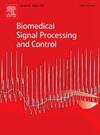Distributed data-privacy preserving federated learning method for sleep stage classification
IF 4.9
2区 医学
Q1 ENGINEERING, BIOMEDICAL
引用次数: 0
Abstract
Artificial intelligence and big data have great promise for promoting sleep medicine assistance. However, obstacles such as data privacy restrictions occur when enough data are collected from different data centers to develop classification models with better performance. Federated learning (FL), a collaborative machine learning approach, aims to address problems by acquiring models rather than directly accessing data from multiple clients. In this work, we utilize federated learning to increase model performance and preserve data privacy when deploying automatic sleep staging methods with insufficient data. And we construct a CNN-Transformer model and design an anti-class ratio (ACR) weighted loss function to complete the classification task with class imbalanced data. We evaluate our model and ACR using Sleep-EDF database and achieve better overall and N1 classification performance. To clearly show the efficiency of FL, we set three different data volume experiments with three independent heterogeneous public sleep databases. The experimental results are compared with two benchmark methods, traditional local learning and data-centralized learning. The results suggest that federated learning method outperforms the local learning approach in classification performance and achieves comparable results with data-centralized learning. As a result, we argue that federated learning is a promising alternative for multiple clients developing sleep staging algorithms especially with insufficient data because it adds benefits in terms of model performance and data privacy protection.
分布式数据隐私保护的睡眠阶段分类联邦学习方法
人工智能和大数据在促进睡眠药物辅助方面有很大的前景。然而,当从不同的数据中心收集到足够的数据以开发具有更好性能的分类模型时,就会出现数据隐私限制等障碍。联邦学习(FL)是一种协作式机器学习方法,旨在通过获取模型来解决问题,而不是直接从多个客户端访问数据。在这项工作中,我们利用联邦学习来提高模型性能,并在部署数据不足的自动睡眠分期方法时保护数据隐私。构造CNN-Transformer模型,设计反类比(ACR)加权损失函数来完成类不平衡数据的分类任务。我们使用Sleep-EDF数据库来评估我们的模型和ACR,获得了更好的整体和N1分类性能。为了清楚地显示FL的效率,我们在三个独立的异构公共睡眠数据库中设置了三个不同的数据量实验。实验结果与传统的局部学习和数据集中学习两种基准方法进行了比较。结果表明,联邦学习方法在分类性能上优于局部学习方法,与数据集中学习的结果相当。因此,我们认为联邦学习对于开发睡眠分期算法的多个客户端来说是一个很有前途的选择,特别是在数据不足的情况下,因为它在模型性能和数据隐私保护方面增加了好处。
本文章由计算机程序翻译,如有差异,请以英文原文为准。
求助全文
约1分钟内获得全文
求助全文
来源期刊

Biomedical Signal Processing and Control
工程技术-工程:生物医学
CiteScore
9.80
自引率
13.70%
发文量
822
审稿时长
4 months
期刊介绍:
Biomedical Signal Processing and Control aims to provide a cross-disciplinary international forum for the interchange of information on research in the measurement and analysis of signals and images in clinical medicine and the biological sciences. Emphasis is placed on contributions dealing with the practical, applications-led research on the use of methods and devices in clinical diagnosis, patient monitoring and management.
Biomedical Signal Processing and Control reflects the main areas in which these methods are being used and developed at the interface of both engineering and clinical science. The scope of the journal is defined to include relevant review papers, technical notes, short communications and letters. Tutorial papers and special issues will also be published.
 求助内容:
求助内容: 应助结果提醒方式:
应助结果提醒方式:


